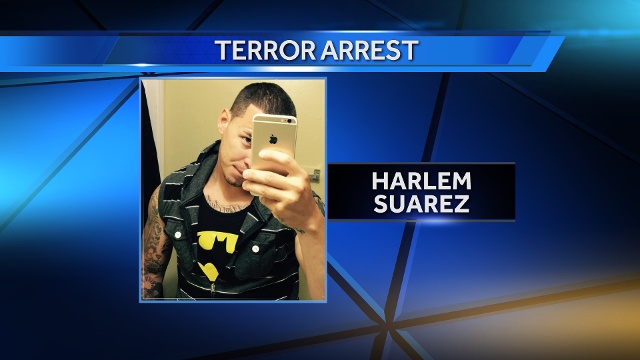Another Arrest of a U.S. Citizen Allegedly Inspired by ISIL to Plot an Attack
Matt Apuzzo and Michael Schmidt had a piece in the New York Times yesterday discussing the Justice Department's shift towards aggressive and early intervention in cases involving suspected ISIL followers in the United States (I've commented on this phenomenon--a revival (or at least reinvigoration) of the early post-9/11 preventive prosecution paradigm--here).

Published by The Lawfare Institute
in Cooperation With

Matt Apuzzo and Michael Schmidt had a piece in the New York Times yesterday discussing the Justice Department's shift towards aggressive and early intervention in cases involving suspected ISIL followers in the United States (I've commented on this phenomenon--a revival (or at least reinvigoration) of the early post-9/11 preventive prosecution paradigm--here). On cue:
Today we learned about the arrest of Harlem Suarez, a U.S. citizen from Key West (see here for the criminal complaint supporting the arrest, and here for a DOJ press release summary). This is the most recent in a remarkable set of arrests involving the following sequence: (i) an individual in the United States is identified as an ISIL supporter based on his social media posts, (ii) the FBI manages to put a confidential source in direct conversation with the person, and (iii) the FBI eventually arrests the person on what might be described as preventive charges. Some of these cases are framed as material-support cases because the person is arrested while trying to make their way to Syria or Iraq. Others, like the Harlem Suarez arrest, instead involve a defendant allegedly prepared to carry out an attack in the United States itself.
Either way, these cases tend to illustrate the inevitable tension between ensuring an early-enough intervention to prevent harm and a variety of costs (including lost opportunities for gathering intelligence and building up the prosecution's case, not to mention that increased risk of outright mistake in terms of whether the person would in fact have gone on to do something harmful). The Apuzzo/Schmidt article summarizes the challenge well:
[C]ritics say the return to a faster-moving approach raises the possibility that, in the rush to make arrests, the government is jeopardizing criminal cases and missing opportunities to gather intelligence. Thomas A. Durkin, a Chicago defense lawyer who has represented clients accused of supporting Al Qaeda and the Islamic State, said the new cases are hurried and not as strong. “Everything is: ‘Not on my watch,’ ” Mr. Durkin said. “ ‘Do you want to be responsible for letting that kid go home? Not me.’ ”
Officials from the Justice Department and the F.B.I. defend the practice, saying their chief mission is to prevent violence. ... [T]hey say sympathizers have repeatedly expressed a willingness to undertake small-scale attacks, such as stabbings and shootings that require little planning. ... One senior law enforcement official said that “if moving quickly stops an attack but hurts our prosecutions, then that’s the price you have to pay to prevent violence.”



.jpg?sfvrsn=d5e57b75_5)

